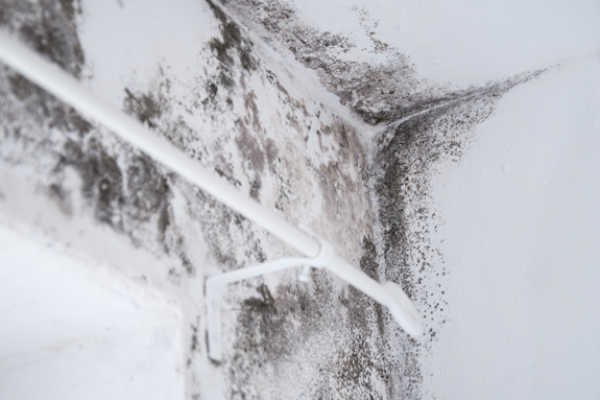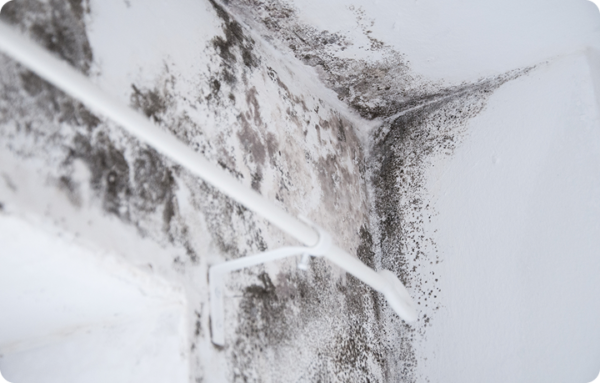To check for black mold, start by looking for visible stains, warped surfaces, or bubbling paint. A persistent, musty smell, increased humidity, or unexplained health symptoms may also indicate hidden mold.
Black mold can quietly grow behind walls, often going unnoticed until it affects your health or damages your home.
In this guide, you’ll learn how to spot the early signs and use basic testing tools to determine if you have a mold problem.
If you are in Pembroke Pines, FL, or the surrounding areas, contact Tip Top Plumbing & Restoration at 954-289-3110 for professional inspection and mold remediation services.
How to Identify if You Have a Black Mold Problem?
Check for wall stains, musty smells, soft spots, or warped paint. Use a test kit or moisture meter to confirm black mold growth, and control humidity with a dehumidifier.
1. Start with a Visual Inspection
Begin your investigation with a basic inspection:
- Look for water stains, warping, or surface dampness
- Focus on areas behind furniture, in basements, or near leaks
- Pay attention to areas with poor air circulation or outdated caulking
You can also lightly press on suspicious wall spots to feel for softness, which may suggest internal mold.
2. Use Your Nose for Musty Smell and Odor
Mold is often detected by its distinct odor before it’s seen. If you notice a persistent musty smell, especially after rain or running a humidifier, this could be a sign of black mold growing behind the wall.
3. Try Using a Mold Test Kit
You can use a mold test kit to gather samples from wall surfaces or air near problem areas. These kits help identify the presence of mold spores and give an indication of potential mold exposure.
For more accurate results, consider buying lab-supported mold test kits that allow you to send samples in for detailed analysis.
4. Check Moisture and Humidity Levels
A moisture meter can measure the amount of moisture in your wall. Readings above 15-17% may indicate hidden growth. Maintain indoor humidity levels between 30% and 50%, especially in areas such as basements or bathrooms. If humidity levels are consistently high, using dehumidifiers can help reduce the risk of infestations.

5. Tap or Knock on the Wall Surface
Lightly knock on the wall to listen for hollow or soft spots, which may indicate mold damage behind the drywall. Sections with internal moisture often sound dull or feel spongy when pressed.
Seek Help From Professional Mold Testing Services
If you are unable to confirm the issue or if the affected area is extensive, professional mold testing and inspection may be necessary. A certified mold inspector will use specialized tools, like thermal imaging cameras, wall scanners, and high-sensitivity meters, to detect hidden moisture and mold growth without damaging your walls. These methods can identify deeper problems that basic tests may miss.
Professional services are especially recommended when:
- There’s a history of leaks, water damage, or persistent moisture issues
- You notice spreading stains or signs of an active black mold infestation
- Mold appears to cover more than 10 square feet
- Anyone in the home has ongoing symptoms linked to mold exposure or other health issues
Contact Us For Black Mold Remediation Service
If black mold growth is confirmed in your walls, it is crucial to take prompt action. Ignoring a mold problem can lead to larger infestations, costly repairs, and long-term health concerns. Even small amounts of mold behind surfaces can spread if left untreated.
For safe and effective removal, contact Tip Top Plumbing & Restoration at 954-289-3110. We proudly serve Pembroke Pines, FL, and surrounding areas with expert mold remediation services to restore your home and peace of mind.
FAQs
Can small leaks really lead to mold inside walls?
Even a minor leak behind drywall can create the moisture that mold needs to grow. If not fixed quickly, they can trigger hidden infestations that spread over time.
When should I call a mold inspector?
If you see recurring signs of mold, smell something musty, or suspect hidden growth due to past leaks, a licensed mold inspector can conduct a thorough evaluation using advanced tools.
How reliable is a mold test kit?
A test kit can help detect mold spores on surfaces or in the air. However, for deeper or more widespread problems, lab testing or professional mold inspection may be more accurate.
What are the health effects of mold exposure?
Mold exposure can lead to respiratory symptoms, allergies, congestion, skin irritation, and in some cases, fungal infections, especially in individuals with sensitivities or weakened immune systems.
How do mold spores spread indoors?
Mold spores travel through the air and settle in damp areas. They often multiply near leaks, poor airflow, or where organic material has built up.
Can poor ventilation make mold worse?
Poor ventilation allows humidity and airborne spores to linger, creating ideal conditions for mold to grow behind walls or around ceilings.
Are dehumidifiers useful for mold prevention?
Absolutely. Dehumidifiers reduce indoor humidity, helping to control moisture in areas such as basements, bathrooms, and laundry rooms.

